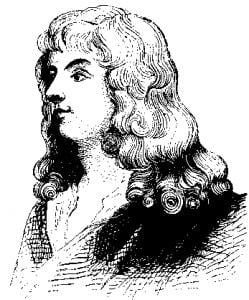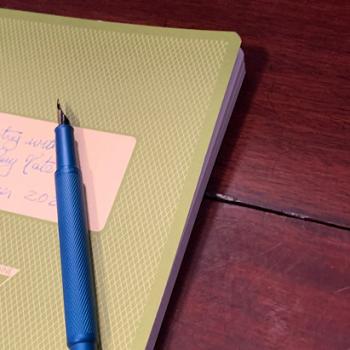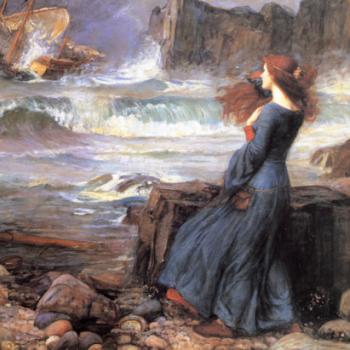 The experts at any given moment can be horrible judges of what is good, true, and beautiful. An author, painter, or filmmaker may be admired in his or her day due to some odd quirk of personality. Sometimes the artist has such an overwhelming personality that liking him makes us like his poetry better. Given enough admiration by the right experts, people less secure in their taste or judgment in an artist, simply repeat the opinion of the experts. Consider the case of Abraham Cowley.
The experts at any given moment can be horrible judges of what is good, true, and beautiful. An author, painter, or filmmaker may be admired in his or her day due to some odd quirk of personality. Sometimes the artist has such an overwhelming personality that liking him makes us like his poetry better. Given enough admiration by the right experts, people less secure in their taste or judgment in an artist, simply repeat the opinion of the experts. Consider the case of Abraham Cowley.
Who can dislike a cavalier who died as an oldling from the effects of an evening with too much jollification? He was a wit, a wag in his day, who wrote a play for the lads at Oxford, was a spy for his exiled king, and heralded his return in epic verse. Evidently, wanting to like the poetry of a likable poet disturbed the judgment of his contemporaries.
He wrote pleasant poetry that did little to disturb his audience. There is nothing wrong with writing verse that pleases your audience, but there is a danger that churning out the stuff will cause you to repeat overused images. Reading Cowley is the poetry equivalent of a catalog of seventeenth century poetry stock photos.
Cowley also, inevitably, starts writing in “poetry,” that strange form of English that is only used by poets being poetical. None of his most admiring friends looking at Cowley himself would have said that his luxuriant mane “fell adown his shoulders with loose care” unless he was trying to make the line work in poem.
Milton thought of angels and gave us Paradise Lost, Cowley An Archangel’s Toliet. The bad poet takes a great theme, goes for a light touch, and ends up absurd. Of Gabriel, we are told he forms the body we see from “a heavenly loom” until he is “all like a comely youth in life’s fresh bloom.” Is this the Archangel that had to tell the Mother of God: “Fear Not?” Note that the description in the line uses over worn images too!
A master poet like Shakespeare who died just two years before Cowley was born could write wimsey without being overly sweet, could take an old image and give it fresh relevance. Cowley could not.
However, in his day and in the period just after his death, Cowley was called “the English Horace!”
The experts are not always wrong, Shakespeare had wealth and honor in his own life. The respect Cowley enjoyed cautions us and provides some warning signs of unmerited praise. Cowley gave the university set, his day’s cultural gatekeepers, what they wanted. He also was one of them having gone to the right schools. Neither thing can be said about Shakespeare who became respected and rewarded despite his background! In evaluating a contemporary artist, this suggests caution with anyone who is telling the cultural powers that be what they wish to hear. Pleasing our pundits by confirming their prejudices, and being one of their own, may cause the pundits to puff up the artist beyond his actual merit.
Don’t we all tend (if not very careful) to think more brilliant anything that just happens to agree with us?
Ask: is the artist saying anything new, breaking new ground, or just repeating things we like to hear (right now) in just the way we like to hear it?
Finally, do not distrust your first impression. Evidently, people kept thinking they should read Cowley for a bit after most people had stopped actually reading him.*
Here for your sins is An Archangel’s Toliet:
An Archangel’s Toliet
When Gabriel (no blessed spirit more kind or fair)
Bodies and clothes himself with thick’ned air
All like a comely youth in life’s fresh bloom
Rare workmanship and wrought by a Heavenly loom!
He took for skin a cloud most soft and bright
That e’er the midday sun pierced through with light;
Upon his cheeks a lively blush he spread,
Washed from the morning beauty’s deepest red;
A harmless flaming meteor shone for hair,
And fell adown his shoulders with loose care;
He cuts out a silk mantle from the skies;
Where the most sprightly azure pleas’d the eyes;
This he with starry vapors spangles all;
Took in their prime ere they grow ripe and fall;
Of a new rainbow, ere it fret or fade,
The choicest piece took out, a scarf is made:
Small streaming clouds he does for wings display;
Not virtuous lovers’ sighs more soft than they,
These he gilds o’er with the sun’s richest rays;
Caught gliding o’er pure streams in which he plays.
Thus drest the joyful Gabriel posts away;
And carries with him his own glorious day.
______________________
The wonderful collection of bad poetry, The Stuffed Owl, stands as a testament to talent gone bad. These are, unlike the poems I wrote in tenth grade, not bad due to a lack of talent. Often these bad poems are written by otherwise magnificent poets (see Tennyson). I owe my knowledge of Cowley to this book. (pages 24-26)













